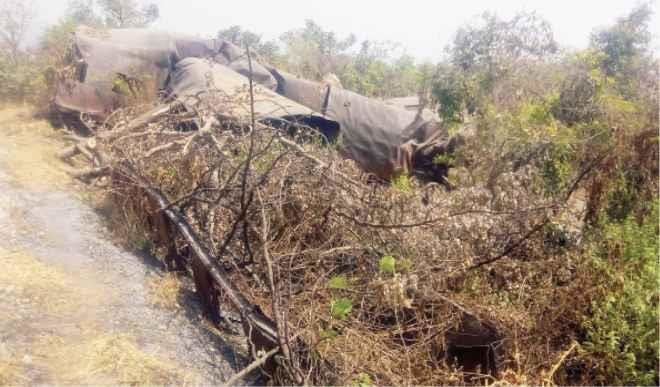
Perhaps one of Nigeria’s unforgettable rail accidents occurred when a train derailed at Langa-langa in present day Nasarawa State on February 16, 1970. Forty-eight years on, the accident still resonates as the worst in the country’s transportation history.
For many families, the then upcoming Eid el-Kabir celebrations turned sour, as many loved ones could not share in the festivity. About 150 lives were lost in the mishap.
The train took off from Jos, stopped at Gudi station and later at Langa-langa enroute Lafia-Makurdi for onward movement to the Southeastern part of the country. But, the trip could not go beyond twenty minutes as the wagons derailed at the winding bends at Langa-langa.
Today, the debris of the mangled train still lay on the sides of the ditch.
Daily Trust gathered that there are plans to evacuate the remaining debris. Some of the hard metal seems to be recently cut and the surrounding bushes have been cleared and burnt to make way for easy access.
Some residents told our correspondent that not long ago, large parts of the wreckage were evacuated while scavengers are also allegedly visiting the area to remove some iron parts.
Langa-langa is a remote village along Akwanga-Keffi highway in Akun Development Area in Akwanga Local Government Area. But the journey into the remote village begins from Gudi, a town believed to have sprung up as a result of the construction of the railway.
From Gudi, the road is very narrow such that two vehicles cannot pass at the same time. The road also has many washed-out culverts so vehicle owners are forced to pass through dry riverbeds to their destinations.
According to some motorists, the one-and-a half hours journey from Gudi to Langa-langa can take only 20 minutes if the road is good. The village is associated with the train disaster that is well remembered not only in the rail history of Nigeria but in all mishaps ever recorded.
An 80-year-old survivor and resident of Langa-langa, Kachalla Waya, recounts the tragic incident which he experienced as he boarded the train to Oturkpo in present Benue State.
He told Daily Trust that: “I just heard a loud sound and found myself outside the train with people screaming and others shouting and calling the name of God. I had sharp cuts on my forehead. I had a cut on my tongue and lost a tooth. I also sustained injuries in some other parts of my body, although still conscious. I was taken to the hospital in Alushi, near Akwanga. Unfortunately, the train fireman that I was taken to the hospital together with died the next day.”
He said he spent three months in the hospital.
Besides, he expressed dismay that neither government, groups nor individuals have bothered to remember the survivors of the horrific train accident and how they are faring.
He said he is still battling with the trauma of the accident. “Anytime I want to cut my hair, I feel severe pains on my forehead especially where I was injured. I also experience pains in my joints,” Kachalla said.
Also, 84-year-old Monday Kpaji relived gory memories of the incident, explaining that passengers were trapped and some had their legs amputated to free them from the mangled train steel.
“I was close by the sharp bend where the train derailed. The engine of the train and the front wagons first derailed. I took part in the rescue operations before government officials arrived. I still remember how we evacuated many victims.
“I remember how many people were screaming for help with blood rushing from their heads and other parts of their body. I can still remember how I and my late friend dragged out one victim with head injuries through the window. We were able to rescue many before fire broke out and we also witnessed how some victims died slowly because goods and wagons trapped them. In such cases we were helpless as there was nothing we could do,” Kpaji added.
“Doctors from Alushi came and provided medical services to the victims at the spot. I witnessed how doctors amputated victims to rescue them from the debris because debris or goods buried most of them. It was the doctors that cut either the legs or hands trapped by iron to save victims. The doctors really worked hard to save many lives,” he noted.
According to him, government officials were overwhelmed with the carnage but evacuated as much victims as they could. However, he explained that they dug a deep trench near the accident scene and buried the dead and pieces of flesh that littered the site.
The first thing that strikes a visitor to Langa-langa is the activities of quarry operators. A youth leader, Ezekiel Sunday, told Daily Trust that the community is benefiting from the resources God has blessed the area with, including quarry and agriculture.
Sunday said the major challenge is access road because most of the inhabitants are peasant farmers who find it difficult to transport their goods to the market.
However, a Chinese company contracted by the government for the quarry activities to rehabilitate the railway lines has constructed some culverts for easy movement of their trucks to the sites. They also filled some potholes and ditches with stones and gravels. Most of the culverts were washed away during the rainy season.
“We are appealing to both federal and state governments to come to our aid in terms of basic amenities in order to reduce the sufferings of the people. We are also appealing to government to help the community in reconstructing the bridge that links Langa-langa and Mada station,” Sunday said.
Four decades after, many Nigerians still remember the Langa-langa accident as if it happened few days ago.

 Join Daily Trust WhatsApp Community For Quick Access To News and Happenings Around You.
Join Daily Trust WhatsApp Community For Quick Access To News and Happenings Around You.

